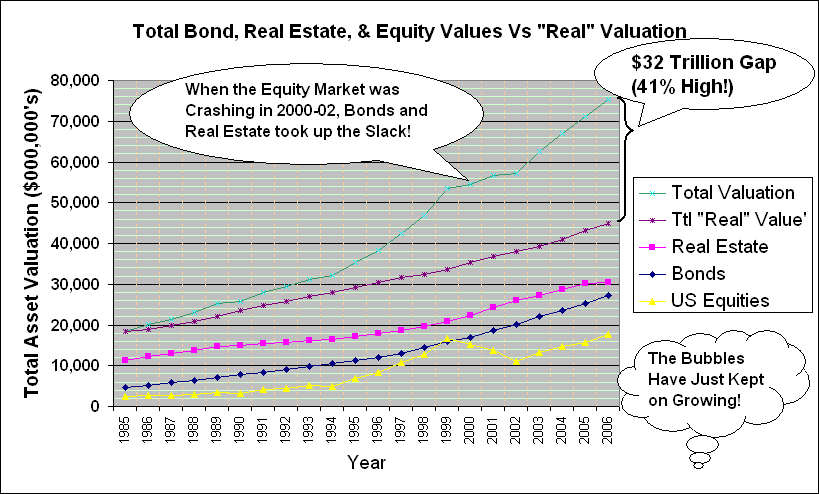AndrewJ -
I've been predicting a new depression ever since "bush + 911" happened, so this is no surprise to me. Here's more of the same :
The Great Depression-2008
http://trailfire.com/housewow/trailview/12034
Quote:
|
In 1999 Congress eliminated all the fail-safe mechanisms put in place after the Great Depression of 1929. It was the Gramm-Leach-Bliley Act and the cause of our next Great Depression. This act enabled mortgage banks for the first time since the Great Depression to get back in bed with the securities industry. Banks could now just originate home loans - regardless of their soundness- and pass off the risk to people who bundled the mortgage into a securities to sell to pension funds and foreign investors. Hence easy mortgage credit to all, and the cause of the current housing price bubble. Today we are on the threshold of the consequence of eliminating 1930's failsafe controls. Hearing Prelude. Today, we will be considering the Gramm-Leach-Bliley Act, one of the most significant laws to come out of this Committee in many years. The Act made profound changes to the laws governing the affiliation of banking, securities, and insurance firms in an attempt to promote the modernization of the financial services sector." Welcome to the next Great Depression.
|
Merrill: $500 Billion in Economy-Wide Mortgage Losses - December 18, 2007, 1:35 pm
http://blogs.wsj.com/economics/2007/...rtgage-losses/
Quote:
Merrill Lynch may have laid down a new high-water mark for estimated losses on mortgages across all investors and institutions, pegging the ultimate tally at $500 billion.
“How did we arrive at that staggering number?†North American economist Dave Rosenberg asks in a report today. “It is the sum of projected losses of $250 billion in subprime loans, [about about 18% of the $1.4 trillion subprime market], $50 billion for Alt-A loans, $100 billion in negative amortization mortgage-backed security option ARMS, and $100 billion in synthetic CDO losses (synthetic CDOs gain credit exposure to the underlying subprime assets via credit default swaps).â€
|
Why the Bush debt-recession will topple Clinton's equity-recession - Jan 18th 2008
http://www.bloggingstocks.com/2008/0...quity-recessi/
Quote:
If you can't pay back the bank, the bank takes your house or your car. If a stock you own loses its value, there's no collateral you can go after to cushion your loss. This is why Bush's debt recession will be far far worse than Clinton's equity one.
The stock market in the last year of George Bush's term is following a pattern that reminds me of the last year of Bill Clinton's. The Clinton market tumble -- where the NASDAQ fell in March 2000, rose through September 2000, and then began a straight down plunge through January 2001 -- preceded a brief recession in 2001. But I think that the Bush recession -- following Dow and broader market quakes in March 2007, August 2007, and the 14% decline since the October peak -- will be much much worse.
...
For all those individual investors who got burned by the dot-com bust, after the dust had settled they had lost lots of money in their stock market accounts, but most people still had jobs, houses, and cars. And Clinton left the Federal budget in surplus with the national debt declining to $5 trillion. Bush used that recession to sell $1.3 trillion in tax cuts and to lower interest rates to 1%. With the $2.4 trillion worth of wars in Afghanistan and Iraq, the Federal budget went into deficit and the national debt ballooned to $9.2 trillion.
|
Why is Economic Depression Imminent?
http://austrianenginomics.com/WhyisE...minentRevA.pdf
Quote:
• Unprecedented Total U.S. Credit Market Debt Relative to Nominal GDP
• Unprecedented Level of Real Estate Overvaluation
• Unprecedented Level of U.S. Trade Deficit
• Persistent Stock Overvaluation
• Unprecedented Level of Resource Misallocation
• Intellectual Complacency
• Increasingly Destructive Monetary Policy
• Persistently Overvalued Dollar
• Increasingly Reluctant Foreign Purchasers of U.S. Debt
• Inept Government and Central Bank Leadership
• In recorded history, fiat currency has never lasted
• The herding nature of crowds when widespread fear follows their discovery of the massive asset illusions and misallocated resources
|

CarloSW2